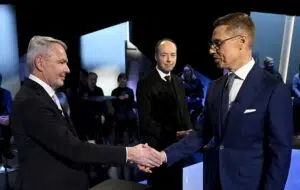Brussels – Everything is ready in Finland for the election of a new
president of the Republic, but indications on the eve of the vote
suggest that a head-to-head between former foreign ministers is
already brewing, with hopes for the Social Democratic candidate
—the European Commissioner for International Partnerships, Jutta
Urpilainen—now down to the lowest of lows. With two days to go
before the polls open, when Finnish voters will choose the
successor to President Sauli Niinistö (in office since
2012), surveys confirm that the most likely scenario is a two-way
challenge between Alexander Stubb for the center-right and
Pekka Haavisto for the Greens, with the runoff scheduled
two weeks later.

Nine candidates will compete in the ballot on Sunday (Jan. 28) to
win the office of president of the Republic of Finland, which since
1994 cannot be renewed after two consecutive terms (each lasting
six years). The president’s main role is to guide the country’s
foreign policy in cooperation with the government, representing
Helsinki at the NATO tables after the historic accession on April 4, 2023.
In addition, the president of the Republic acts as commander-in-chief
of the military, appoints and accepts the resignations of members of
the executive branch, high-ranking civil servants, and Supreme Court
judges. Finally, at the motivated request of the prime minister, he can
order the dissolution of the Eduskunta (Finland’s single-chamber
parliament) and call early elections.

From left: Green League candidate, Pekka Haavisto, and National Coalition Party candidate, Alexander Stubb (credits: Vesa Moilanen/Lehtikuva/Afp)
Victory in the first round of the presidential election is guaranteed
only by achieving 50.01 per cent of the votes, otherwise, there’s
a runoff between the two candidates with the most votes.
Barring any last-minute surprises at the polls, the latter is the most likely
prospect in this round, and Stubb and Haavisto are the leading
candidates to go head-to-head on 11 February: the candidate
of the centre-right National Coalition Party (head of
foreign affairs between 2008 and 2011 and former prime minister
between 2014 and 2015) seems to lead with 27 per cent of voting
intentions, while the Green League candidate and former foreign
minister in the government led by Sanna Marin would be trailing
by only 4 points.

Commissioner for International Partnerships, Jutta Urpilainen, and candidate of the Social Democratic Party of Finland
More distant are the other seven challengers, starting with the
candidate of the far-right True Finns, Jussi Halla-Aho, in third place
with 18 per cent and the Keskusta liberal-backed independent
Olli Rehn (former commissioner from 2004 to 2014) fourth with
14 per cent. Almost a débâcle for Finland’s current EU commissioner
Urpilainen—since December 2 last year on unpaid leave—who has
failed to turn around the fortunes of the Social Democratic Party
after the defeat in the elections of April 2023 and the formation of the
right-wing coalition currently governing. The social-democratic
candidate is expected to stop at 5 per cent of the
vote and would be ready to return to her role on the Board of
Commissioners.
Finns can vote early (the window was
between Jan. 17 and Jan. 23) and, according to the Ministry
of Justice, about one-third of eligible voters
have already expressed their preference in this manner.
So, the results of the first round are expected to be published
quickly, even before midnight on 29 January, since the outcome
of ballots delivered before January 23 will be announced as soon
as the polls close. Official confirmation from Helsinki will come
in any case on Tuesday (Jan. 30).





